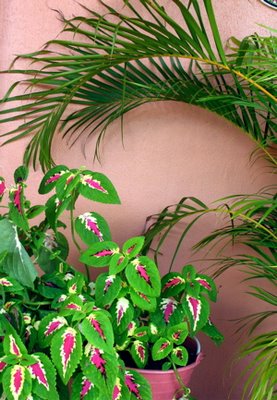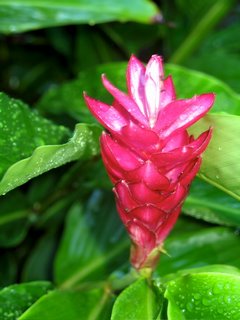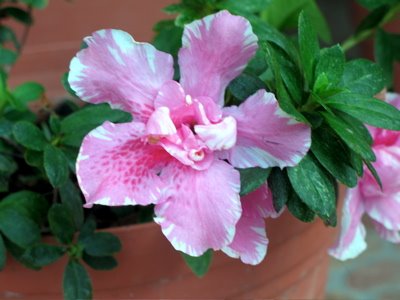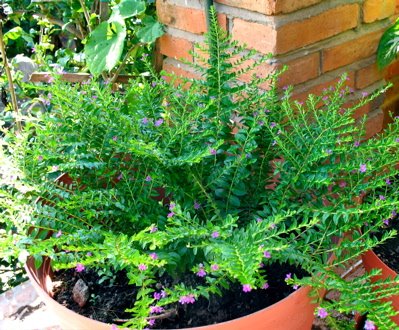 This coleus, grown from seed, is about 12 weeks old.
This coleus, grown from seed, is about 12 weeks old.Many starts have been removed by enthusiastic local gardeners, hence the peculiar shape.
I have to say I was surprised they mostly survived. The dirt around the house looks and feels like hard, heavy clay. And the run-off from the cement mixing (by hand) during the construction of the house, didn't help much either. If you want holes for plants around this house, you have to hire a strong worker using a pry bar to dig the holes for 20 pesos a hole.
There are some new bouganvilleas with nice colors. I had to move three that were dying in a difficult location. But one of the three is surviving beautifully in its new home.

 And a Ginger plant (Zingiberaceae family with about six blossoms starting to open right now.
And a Ginger plant (Zingiberaceae family with about six blossoms starting to open right now.And there are two "Hankerchief Plant"/"Buddha's Lamp" (Rubiaceae family) plants just covered with blossoms.
The homeowner has added a few temperate-climate plants to the mix, including this lovely Mexican Heather (Cuphea) which seems to be thriving here. It has tiny violet flowers, and is not only surviving, it is multiplying. It doesn't look like a tropical-type plant to me, but it's doing fine. Turns out this plant orginated in Mexico.
 The other non-tropical here is an (?)azeala (spelling?) I think. Actually, I don't think it is an axaela. Any suggestions for a name? Also thriving. In the shade.
The other non-tropical here is an (?)azeala (spelling?) I think. Actually, I don't think it is an axaela. Any suggestions for a name? Also thriving. In the shade.And the new hisbiscus has lucious deep red blossoms.




3 comments:
I know your "mystery plant" as Mexican Heather. It's one of our tough-as-nails plants in Louisiana. Blooms often and always comes back in the spring.
Yes, mine looks just like that and the tag said only "Mexican heather". If there's a variety name, they weren't saying!
I believe one of the scientific names is "Cuphea".
Post a Comment